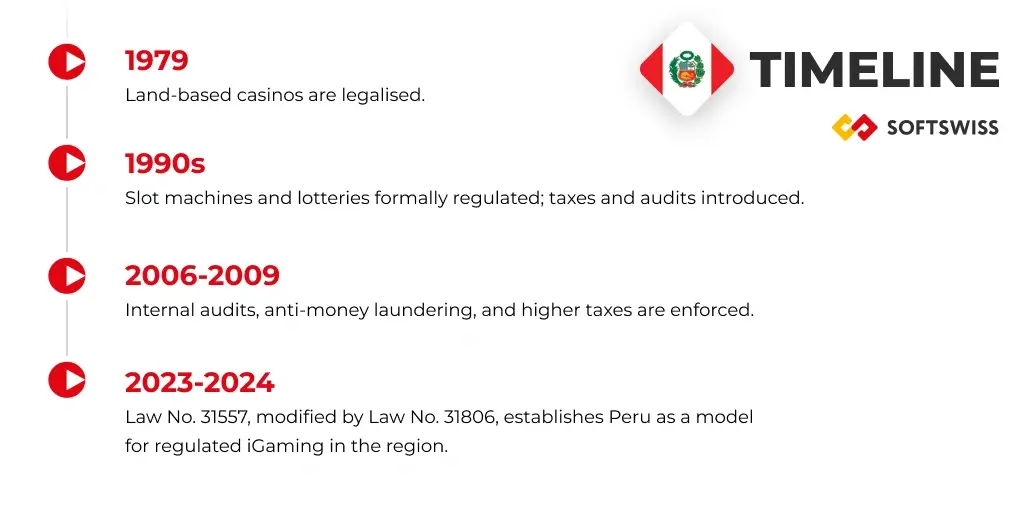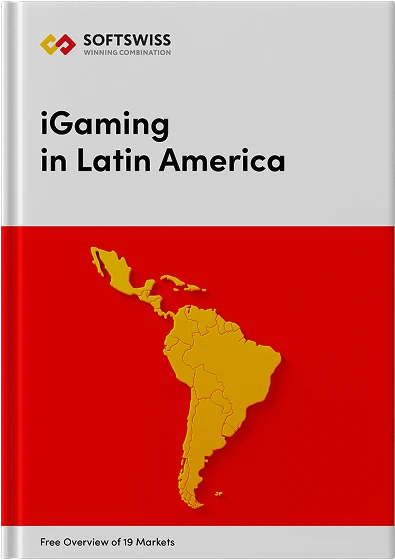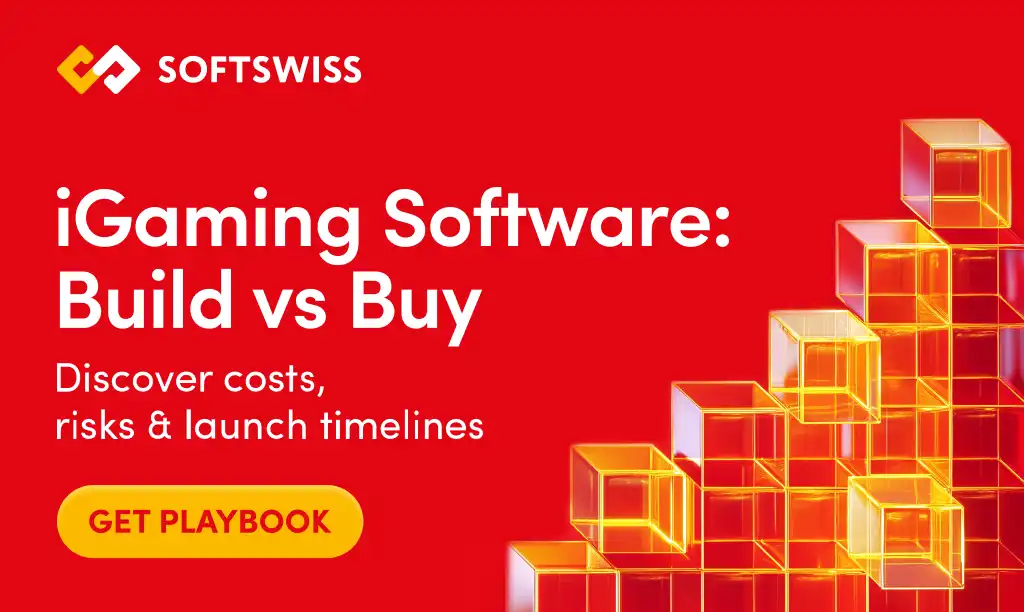Why Open an Online Casino in Peru?
It is no coincidence that Peru is on the iGaming industry's radar. The past decade has brought significant economic change and improved gaming regulation in the country, both offline and online, positioning it as an attractive market for iGaming companies.
Peru was one of the fastest countries in Latin America to recover from COVID, showing continued Growth Domestic Product (GDP) increase of 4.7% in 2024. The country’s GDP per capita is expected to increase by 19.45% in 2030 when compared to the average registered in 2025, and is projected to keep rising as foreign investment pours in. Peru’s strong economic recovery, young digital-savvy population, and clear online gambling legislation are making it a strategic country for iGaming businesses expanding in Latin America.
Key Insights
- Licensing is non-negotiable: All operators and their B2B partners must be licensed/registered with Ministerio de Comercio Exterior y Turismo (MINCETUR); unlicensed operations face bans and heavy fines.
- Regulations: Peru has fully regulated online casinos and betting market, with Laws 31557 and 31806, and Supreme Decree 005-2023-MINCETUR in force since February 2024.
- Crypto is a no-go: Cryptocurrency payments are not allowed under current law; only fiat is permitted.
- Strong Market Growth: With over 1 billion euro in annual online gambling volume and over 80% internet penetration, Peru is among the fastest-growing iGaming markets in Latin America.
- Local Hosting & Compliance: Servers, data, and all player information must be hosted in Peru; software must be certified by labs like GLI or BMM.
- Player Preferences: Football betting, mobile-first experiences, and cash-based local payment solutions (like PagoEfectivo).
The Evolution of Gambling in Peru: a Historical Overview
The history of casinos and gambling in Peru is not old, and it is unnecessary to go far back in time to get to the starting point. On 1 May 1979, Peru authorised the operation of brick-and-mortar casinos within its borders. Eleven years later, slot machines received legal approval for use. Initially, slot machine rooms were subject to a mere 3% tax rate for the first two years. From 1992 onwards, that tax was raised to 20%.
Closer to the present day, there were two significant moments in the evolution of casinos and gambling in Peru. In 2006, the Casino and Slot Machine Gaming Activity Law was enacted and approved with many new conditions, including increased taxes. In 2009, new regulations were issued requiring casinos, halls, and companies to conduct internal audits and designate funds to combat the financing of crimes such as money laundering or other illicit activities.
Finally, on 13 August 2023, the long-awaited Law N 31557, which regulates online casinos and betting businesses, was published. This way, Peru's iGaming situation changed utterly, joining the list of regulated countries in LatAm, such as Brazil, Argentina, Colombia, and Panama.

The iGaming Market in Peru
Starting an online casino in Peru can be very attractive because Peruvians have been playing and betting for years. Peru currently has a well-established land-based gambling market.
Today, there are more than 20 casino halls with 250 gaming tables. In terms of slot machines, there are more than 700 registered gaming halls with almost 75,000 slot machines, distributed in various locations, including 60 hotels and 150 restaurants. The physical gaming industry, in 2022, produced an average of 122 million euro and generated more than 87,000 formal jobs in the country.
iGaming in Peru, or the Peruvian online gambling market, is of particular interest. On the one hand, the numbers show that the Peruvian population has a strong gaming culture. Even more vital is the passion for sports, mainly football. The enduring popularity of sports betting in Peru is evident in the robust numbers of the iGaming industry, with promising forecasts for future growth.
In 2024, the revenue from online casino games and sports betting reached over 291,90 million euro. This figure is expected to grow 6.19% from 2024, reaching 390 million euro by 2029. These figures place Peru among the top 5 markets in Latin America that generate the most money from the iGaming industry.
The growth of the iGaming industry in Peru is significantly influenced by advancements in technical and technological infrastructure. This progress began when the pandemic underscored the connectivity gap in Peru. Many students and workers in remote areas and urban centres lacked access to the internet or devices, leaving them out of the education and employment system.
To reverse the situation, the State opted to invest in telecommunications infrastructure and expand the areas of connectivity. Additionally, they launched assistance programs in collaboration with other organisations, such as Todos Conectados, Conecta Selva and Cultivo Talento Digital.
In addition to expanding Internet access to more of the population, the increase in Peru's GDP also had a significant impact on the country's online casino and sports betting market.
The INEI's National Household Survey (ENAHO) for the year 2022 provided valuable data for the iGaming industry in Peru:
- 92.6% of households in Metropolitan Lima have access to the internet.
- 83% of homes in the rest of the country have internet access.
- 99.3% of households in the country have at least one technological device to access the internet.
Other results from 2024 show an average growth of 19% in internet connections over the previous year.
Peru Gaming Regulations
When considering opening an online casino in Peru, it is crucial to understand the legal situation of the industry in the country. The first law related to gambling was created in 1840. Still, it was only during the 1990s that the laws regulating land-based casinos, lotteries, and sports betting were updated and clarified.
The laws that regulate each activity are the following:
- Law No. 27153 – Regulates the exploitation of Casino Games (1999).
- Law No. 21921 – General Law on Lottery Branches (1977).
- Law No. 10293 – General Law for Sports Event Gamblers (1945).
- Law No. 31557 – Modified by Law No. 31806 (2023) and Supreme Decree 005-2023 MINCETUR (2023), regulates remote gaming and remote sports betting (2022).
The Ministry of Foreign Trade and Tourism (MINCETUR) supervises the laws related to casino games and betting on sporting events. The lawyers of Programa Integral Nacional para el Bienestar Familiar (INABIF) are in charge of regulating lottery activities.
Law No. 31557
The legality of online gambling and online casinos in Peru is a reality. Law No. 31557 officially came into force on 9 February 2024.
MINCETUR opened registrations for gambling houses and casinos to apply for authorisation between 13 February and 13 March 2024. More than 150 companies submitted their applications for the operating licence.
If applicants prove that they comply with all regulations, they will be able to operate legally, and Peruvians will be able to gamble in a transparent and safe environment.
Some of the most essential measures of Law No. 31557 are the following:
- All operators wishing to offer services in Peru, whether domestic or foreign, must register by complying with the process stipulated by law.
- Online casinos and remote sports bookmakers could be heavily sanctioned and banned if they operate illegally.
- All companies, whether domestic or foreign, will have to pay a special gaming tax, at 12% of the net profit.
- MINCETUR reserves the right to block websites, IP addresses, URLs and/or computer applications that offer remote gambling and sports betting services that are not authorised on a national level.
- Tax revenues from iGaming companies will be allocated as follows: 40% to the public treasury, 40% to tourism development, and 20% to mental health promotion.
Most Popular Payment Methods for Online Casinos in Peru
For most players, the payment experience can make or break their trust in an online casino. Peruvians like to use methods that fit their daily lives: some prefer paying online, while others still rely on cash or more traditional bank transfers. This is why casinos looking to succeed in Peru need to provide a good mix of payment options.
The most commonly used payment methods are the following:
| Credit/Debit Cards | Visa and MasterCard. |
| Bank Transfers | Banco de Comercio, Banco de Crédito del Perú, Banco Interamericano de Finanzas (BanBif), Banco Pichincha or BBVA. |
| E-Wallets | Neteller, PayPal, Skrill, AstroPay |
| PagoEfectivo | A payment method that allows customers to pay for goods and services in cash at the point of sale or online through a secure payment gateway. |
Is Bitcoin Gambling Legal in Peru?
Bitcoin gambling is not legal in Peru. The country’s current gambling laws explicitly prohibit the use of Bitcoin and other cryptocurrencies for any form of gambling transaction, including deposits, wagers, and payouts. This restriction is set out in Article 38(d) of the 2023 regulations, which makes it clear that licensed operators cannot offer or process crypto payments on their platforms.
Violating this rule can have serious consequences, including heavy fines and the potential loss of your operating licence.
In short: Even if your site offers crypto elsewhere, for Peru, you must fully separate and restrict those features to remain legal.
Launching an Online Casino in Peru: Short Guide
- Form a local entity or partner with a Peruvian company.
- Select a MINCETUR-licensed platform and game providers.
- Integrate local payment solutions (cards, bank transfers, PagoEfectivo, e-wallets).
- Obtain all software certifications (GLI, BMM, etc.) and pass platform audits.
- Submit your licence application with all supporting documents.
- Implement KYC/AML and responsible gaming measures (including self-exclusion tools).
- Test and soft-launch under regulatory oversight, then go fully live once approved.
Technology and Compliance: What Operators Need to Know
To operate an online casino in Peru, you’ll need to meet several strict technology and compliance standards.
You can’t go live in Peru unless your B2B providers – platform, game content, payment, and data services – are also compliant. Always request up-to-date documentation from each provider: their MINCETUR approval, certification reports, and service agreements. Using unlicensed partners could lead to licence rejection or even suspension after launch. The best practice: choose vendors already approved in Peru to minimise delays.
Certification is essential: your games, random number generators (RNGs), and platform software must all be tested and certified by accredited labs such as GLI or BMM before going live. For regulatory oversight, your platform must be able to generate real-time data feeds or detailed reports for MINCETUR, allowing authorities to monitor compliance at any time.
Additionally, KYC (Know Your Customer) and AML (Anti-Money Laundering) measures are mandatory. This means integrating automated ID verification checks and strong anti-fraud tools into your onboarding and transaction processes. Besides, responsible gaming features must be built into your site. These include self-exclusion options, player protection limits, and clearly visible links to support resources.
How to Choose a Casino Platform Provider for Peru
The key to success in the iGaming market in Peru lies in finding a platform provider that is an appropriate match with your business goals. Any operator should seek the quality of service and support, hosting, licensing coverage, payment infrastructure, website design and a diverse catalogue of game content.
SOFTSWISS strongly emerges as a solid company to provide operators looking to enter the Peruvian market with ideal options to have the most demanded games in the country and offer other options to improve their service, such as a quality sportsbook platform or different tools for player retention and attraction.
Marketing an Online Casino in Peru
When it comes to ads and promotions, only licensed operators are allowed to advertise in Peru. All advertising must include responsible gambling warnings and make terms and conditions clear to the audience. It’s important to remember that minors cannot be targeted under any circumstances. There are also restrictions on when and where gambling ads can appear, with limits during certain hours and on media platforms that are popular with younger audiences.
This framework gives operators some flexibility in promoting sportsbooks and online casinos within Peru. Still, it is essential to consider the examples of other Latin American countries with a regulated market, where amendments to the original laws are now being pursued to establish new restrictions on promotion.
There are effective marketing strategies in iGaming that work well across all markets without violating established regulations. To attract users, it is common to utilise ratings, affiliate casino review networks, affiliate blogs, online media banners, social media pages, and other dedicated online resources.
All of these actions fall under affiliate marketing, an effective strategy that requires work and resources on the operator's part. SOFTSWISS provides a great tool to monitor affiliate marketing, fine-tune online gaming marketing efforts, and successfully enter the promising Peruvian online casino market.
Conclusion
Peru’s iGaming market is experiencing a transformation that is impossible to ignore. Besides, it offers a strategic combination: a well-established culture of gambling, an enthusiastic and mobile-first player base, and the kind of regulatory certainty that allows businesses to plan for the long term. The recent implementation of Law 31557 and its supporting regulations has set a new standard for transparency and player protection, opening the door to responsible growth and healthy competition.
Success in Peru, however, demands more than just meeting the minimum requirements. To truly stand out, operators need to embrace local payment preferences, prioritise compliance in every detail and deliver a seamless, mobile-friendly user experience. With football driving most bets and an ever-growing appetite for innovative iGaming content, tailoring your offer to what Peruvian players love is key.
It’s also vital to stay adaptable. As the market matures, regulations will continue to evolve, and the most successful brands will be those that invest in responsible marketing, transparent communication, and ongoing compliance. By working with experienced partners like SOFTSWISS, which understands both the technical and cultural nuances of the region, new entrants can hit the ground running and build long-term trust with both players and regulators.
- Is online gambling legal in Peru?
-
Yes. Online gambling and sports betting in Peru are fully regulated under Law No. 31557, as modified by Law No. 31806 and Supreme Decree 005-2023-MINCETUR, which took effect in February 2024. Operators can apply for authorisation and operate legally once registered with MINCETUR.
- What licence is needed to operate an online casino in Peru?
-
All operators must be licensed and registered with the Ministry of Foreign Trade and Tourism (MINCETUR) to offer online casino and betting services. Unlicensed operations can be banned and face heavy sanctions.
- What are the main compliance requirements in Peru?
-
Operators must host servers and player data in Peru, use software certified by recognised labs (e.g., GLI or BMM), implement strong KYC/AML and responsible gaming measures, and integrate local payment methods that fit player preferences.
- What taxes do licensed operators pay in Peru?
-
Licensed iGaming companies in Peru pay a special gaming tax, calculated as a percentage of net profit, with revenues allocated to the public treasury, tourism development, and mental health promotion.


